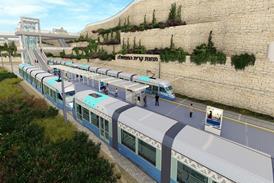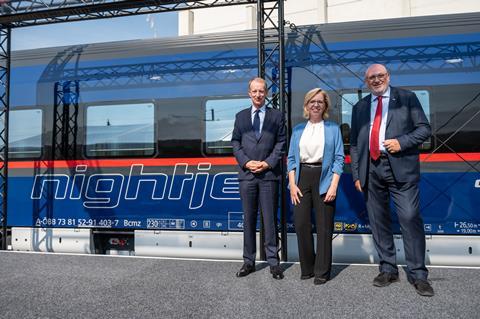
AUSTRIA: ‘With this train, we are entering a new age of night time travel’, said Austrian Federal Railways CEO Andreas Matthä when the interior design of the next generation of Nightjet sleeping and couchette cars was unveiled at the Siemens Mobility plant in Wien on September 6.
He said ‘the night train has become the epitome of sustainable travel, and our Nightjet is a synonym for night trains in Europe’. ÖBB has tried to incorporate what its customers said they wanted from new trains: ‘high comfort, more privacy, better services, relaxed travelling from one city centre to another’, he added.
Design and accommodation
‘The trains are highly innovative: they will be the global benchmark for years to come, and they stand out due to their comfort for travellers and their sustainability and flexibility’, said Albrecht Neumann, CEO of Rolling Stock at Siemens Mobility at the unveiling.
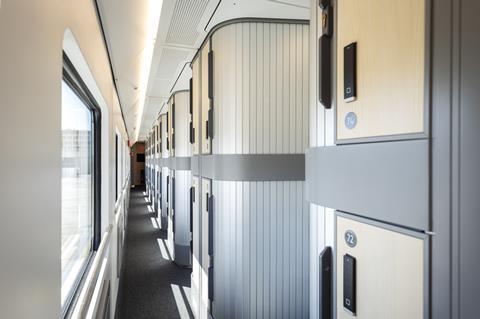
Each fixed-formation seven-car push-pull set will have a capacity of 254 passengers. There will be three couchette cars with four-person compartments, two sleeping cars with two-berth compartments, and seats in the push-pull driving car and in a multifunctional vehicle which will also have space for six bicycles, luggage and winter sports equipment.
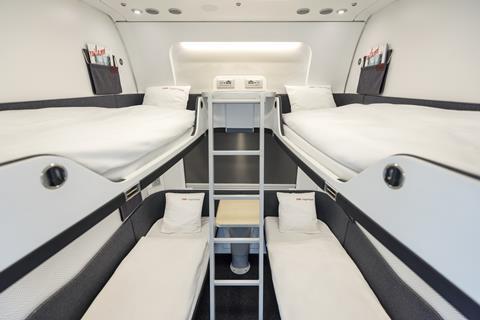
The couchette cars will include ‘mini cabins’ for people travelling alone, meeting modern travellers’ desire for greater privacy. These will feature a storage area, a folding breakfast table with integrated mirror, coat hooks, reading light and luggage lockers next door.
There will be an accessible couchette compartment and toilet, accessed via a low-floor entry.
All compartments will have their own toilets and showers.
Technical innovations and features
There will be wi-fi throughout, along with power sockets, USB ports, inductive charging points and windows designed to enable mobile phone signals to pass easily.
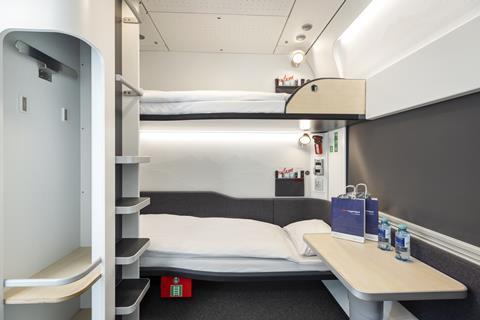
The compartments will have a control panel for operating the lights or calling onboard staff. Security features include CCTV, and NFC cards for compartment access.
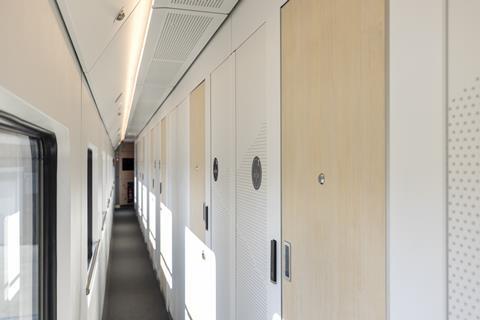
The bogies developed by Siemens Mobility and Technische Universität Graz aim to provide a particularly quiet ride and are 30% lighter than previous designs, lowering lifetime energy costs and reducing the impact on the track, while enabling the maximum speed of night trains to be raised from 200 to 230 km/h.
Nightjet services
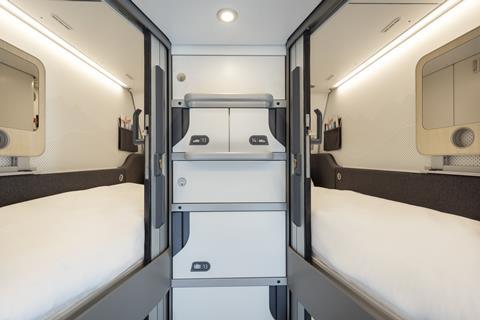
ÖBB ordered an initial 13 Nightjet sets in August 2018 and a further 20 in August 2021, taking the total order to 33 sets costing more than €700m.
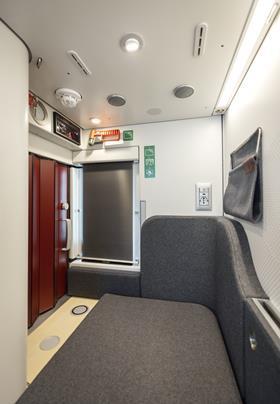
The first are scheduled to enter service in September 2023 on routes from Wien and München to Roma, Milano, and Venezia; Matthä said the route to the Adriatic city is his favourite, and he aims to be on the first train.
All 33 trains are expected to in service in 2025, replacing the majority of the existing night train stock on routes in Austria, Germany, Italy, Switzerland and the Netherlands.
Neumann said concerns about the climate had created new demand for night trains, and this required a new product. Development was challenging, as the trains must be comfortable, financially viable and reliable while being able to cross borders ‘as easily as a car’, despite difference such as differing electrical supply systems.
The trainsets are part of Siemens Mobility’s Viaggio loco-hauled coach family and have a modular design which should enable operation in additional countries.
Production was delayed by the pandemic, with up to 30% of employees at the factory off work at certain times, while component supplies were also delayed.
Alternative to flying
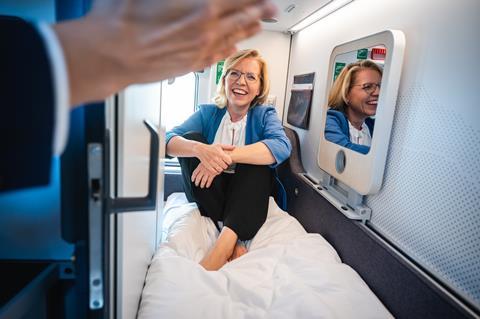
Federal Minister of Climate Protection Leonore Gewessler said other operators had quit the night train business in recent years, but the new trains are ‘what the future looks like’.
She added that ‘when you travel by night train, you choose the most relaxed way to travel. You also contribute to reducing CO2 emissions: travelling with the Nightjet is around 50 times more climate-friendly than an aeroplane.’
Gewessler is a regular night train user, and hopes the new trains will also prove attractive to her ministerial colleagues.
‘Night trains are gaining momentum throughout Europe, because they’re the climate-friendly alternative to short haul flights’, she said, and the new stock will attract attention from across Europe. ‘When I said we would have a renaissance of the night trains everyone smiled at me… now they are asking “how do you do that?”’
Looking ahead, she said ‘Europe needs more railway and the railway needs more Europe’. For the rail network to connect the continent, ‘we need to have things like ticketing booking online, all of that needs to be easier on a European level’.
- Subscribers can read an overview of Europe’s night train renaissance.




